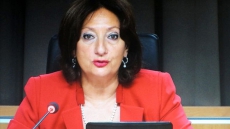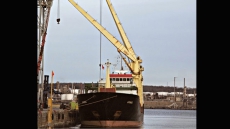Vancouver residents were voting Saturday in an election that turned out to be a tight race between the city's current mayor, whose progressive policies led to complaints he moved too aggressively without listening to the public, and an opponent who had a comparatively low profile before the campaign.
Vancouver Mayor Gregor Robertson, the founder of the Happy Planet juice company and a former NDP member of B.C.'s legislature, was elected in 2008. Many Canadians remember him as the city's public face during the 2010 Winter Olympics.
Robertson and his Vision Vancouver party entered the campaign the clear front-runners against their main rival, Kirk LaPointe of the Non-Partisan Association, a newcomer to politics who was relatively unknown outside his colleagues in the news media.
But polls suggested Robertson's lead had waned in the final weeks of the campaign, which turned increasingly ugly as LaPointe accused the mayor of corruption and Robertson, in turn, filed a defamation lawsuit.
No clear ballot issue emerged during the campaign, which instead focused on the perception that Robertson has spent six years implementing policies on issues such as social housing, density and bike lanes without consulting residents or listening to their concerns.
Robertson responded to those complaints during an all candidates' debate this past Wednesday, using the debate's opening question to deliver an unprompted apology to voters.
"When I haven't met your expectations, I am sorry," said Robertson. "And I know that if I am re-elected again, and honoured to have that position going forward, that I can do better."
Robertson also used the debate to make the case for strategic voting, urging supports of a left-leaning third-place party, the Coalition of Progressive Electors, to vote for him to keep LaPointe out of office.
LaPointe cast Robertson as a left-wing ideologue who routinely ignored residents' concerns, particularly when it came to bike lanes and development. He also criticized the mayor for opposing a Kinder Morgan oil pipeline before a federal review was complete and he accused Vision Vancouver school trustees of putting politics above students when they rejected classroom funding from Chevron.
When a video surfaced during the campaign showing a Vision councillor soliciting donations from a union while pitching the party's policy of not contracting out city work, LaPointe ran advertising that accused Robertson and his party of corruption.
The ads prompted Robertson to file a defamation lawsuit, though the legal manoeuvre did not appear to affect LaPointe's messaging.
LaPointe attempted to contrast Robertson's leadership style by promising to create a city hall that is more transparent and to ensure residents are properly consulted — and their concerns taken into account — on major policies.
For example, when it comes to development and housing, a significant issue in a city where housing costs are the most expensive in Canada, LaPointe promised a renewed city-wide planning process to guide policy and respond to potential concerns. However, that approach allowed him to avoid providing many specifics about just what he would do.
Before entering politics, LaPointe had a long journalism career that saw him work at several major news outlets, including The Canadian Press, where he served as Ottawa bureau chief, and the National Post, where he was executive editor. He was senior vice-president of news at CTV in the early 2000s before becoming managing editor of the Vancouver Sun newspaper.
Most recently, LaPointe served as ombudsman of CBC News and he is also an adjunct journalism professor at the University of British Columbia.





